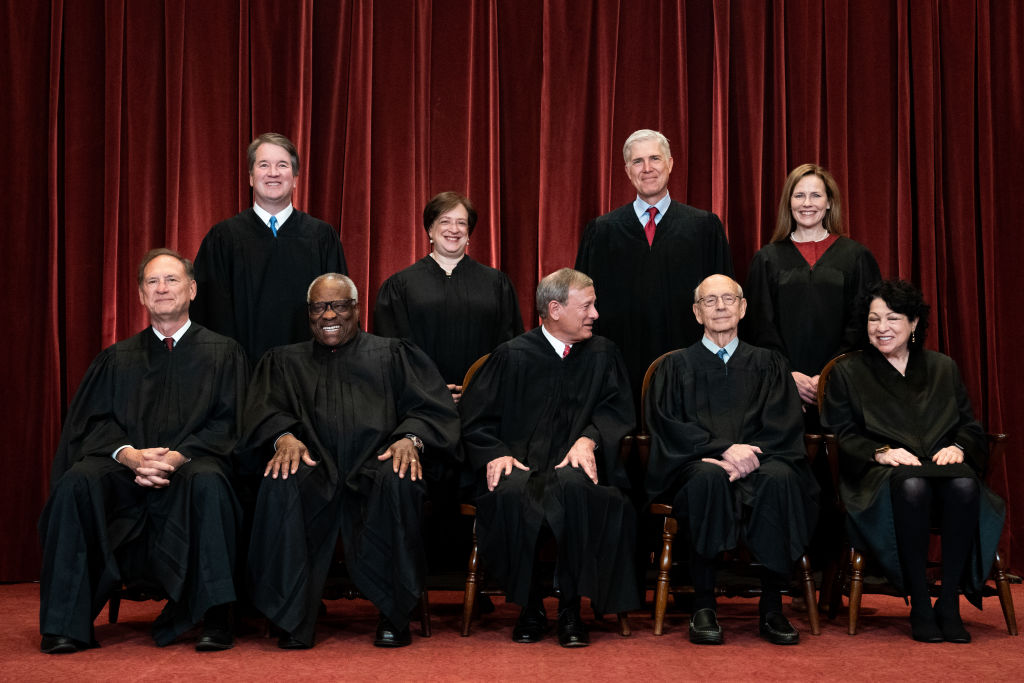Chief Justice Roberts, 3 other dissenters slam colleagues for hastily rewarding Texas 'bounty hunter' abortion ban scheme


A free daily email with the biggest news stories of the day – and the best features from TheWeek.com
You are now subscribed
Your newsletter sign-up was successful
A sharply divided Supreme Court early Thursday said it will not block a new Texas law that deputizes any Texan to enforce a six-week ban on abortions. Five justices — Clarence Thomas, Samuel Alito, Neil Gorsuch, Brett Kavanaugh, and Amy Coney Barrett — explained in a brief, unsigned majority opinion that the abortion advocates asking for an emergency stay "raised serious questions regarding the constitutionality of the Texas law at issue," but they were unable to untangle the "complex and novel antecedent procedural questions" raised by the law.
The four dissenters — Chief Justice John Roberts and Justices Stephen Breyer, Sonia Sotomayor, and Elena Kagan — argued in separate rebuttals that their five colleagues, without any real debate, were rewarding Texas lawmakers for inventing a novel scheme to stomp on decades of Supreme Court precedent.
"The statutory scheme before the Court is not only unusual, but unprecedented," Roberts wrote, and he would have granted "preliminary relief" at least until "the courts may consider whether a state can avoid responsibility for its laws in such a manner." Instead, the court allowed the law to take effect before lower courts weighed in, "without ordinary merits briefing, and without oral argument."
The Week
Escape your echo chamber. Get the facts behind the news, plus analysis from multiple perspectives.

Sign up for The Week's Free Newsletters
From our morning news briefing to a weekly Good News Newsletter, get the best of The Week delivered directly to your inbox.
From our morning news briefing to a weekly Good News Newsletter, get the best of The Week delivered directly to your inbox.
Sotomayor was more direct, calling the court's decision "stunning" and saying the five-justice majority "opted to bury their heads in the sand" while Texas "flouts nearly 50 years of federal precedents" by "outsourcing the enforcement of unconstitutional laws to its citizenry." Essentially, "the Texas Legislature has deputized the state's citizens as bounty hunters, offering them cash prizes for civilly prosecuting their neighbors' medical procedures," she wrote, and the court is rewarding this "breathtaking act of defiance — of the Constitution, of this court's precedents, and of the rights of women seeking abortions throughout Texas."
Breyer wrote that he doesn't see how Texas' enforcement-delegation scheme "should make a critical difference," since it still "threatens to invade a constitutional right."
Kagan said the court should not have greenlighted a "patently unconstitutional law" with barely any discussion and "less than 72 hours' thought." The five justices gave only "cursory" review to the submitted documents, and "barely bothers to explain its conclusion — that a challenge to an obviously unconstitutional abortion regulation backed by a wholly unprecedented enforcement scheme is unlikely to prevail," she added. "In all these ways, the majority's decision is emblematic of too much of this court's shadow-docket decisionmaking — which every day becomes more unreasoned, inconsistent, and impossible to defend." You can read all the opinions.
A free daily email with the biggest news stories of the day – and the best features from TheWeek.com
Peter has worked as a news and culture writer and editor at The Week since the site's launch in 2008. He covers politics, world affairs, religion and cultural currents. His journalism career began as a copy editor at a financial newswire and has included editorial positions at The New York Times Magazine, Facts on File, and Oregon State University.
-
 The ‘ravenous’ demand for Cornish minerals
The ‘ravenous’ demand for Cornish mineralsUnder the Radar Growing need for critical minerals to power tech has intensified ‘appetite’ for lithium, which could be a ‘huge boon’ for local economy
-
 Why are election experts taking Trump’s midterm threats seriously?
Why are election experts taking Trump’s midterm threats seriously?IN THE SPOTLIGHT As the president muses about polling place deployments and a centralized electoral system aimed at one-party control, lawmakers are taking this administration at its word
-
 ‘Restaurateurs have become millionaires’
‘Restaurateurs have become millionaires’Instant Opinion Opinion, comment and editorials of the day
-
 Ex-South Korean leader gets life sentence for insurrection
Ex-South Korean leader gets life sentence for insurrectionSpeed Read South Korean President Yoon Suk Yeol was sentenced to life in prison over his declaration of martial law in 2024
-
 Rubio boosts Orbán ahead of Hungary election
Rubio boosts Orbán ahead of Hungary electionSpeed Read Far-right nationalist Prime Minister Viktor Orbán is facing a tough re-election fight after many years in power
-
 Key Bangladesh election returns old guard to power
Key Bangladesh election returns old guard to powerSpeed Read The Bangladesh Nationalist Party claimed a decisive victory
-
 Epstein files topple law CEO, roil UK government
Epstein files topple law CEO, roil UK governmentSpeed Read Peter Mandelson, Britain’s former ambassador to the US, is caught up in the scandal
-
 Iran and US prepare to meet after skirmishes
Iran and US prepare to meet after skirmishesSpeed Read The incident comes amid heightened tensions in the Middle East
-
 EU and India clinch trade pact amid US tariff war
EU and India clinch trade pact amid US tariff warSpeed Read The agreement will slash tariffs on most goods over the next decade
-
 Israel retrieves final hostage’s body from Gaza
Israel retrieves final hostage’s body from GazaSpeed Read The 24-year-old police officer was killed during the initial Hamas attack
-
 China’s Xi targets top general in growing purge
China’s Xi targets top general in growing purgeSpeed Read Zhang Youxia is being investigated over ‘grave violations’ of the law
